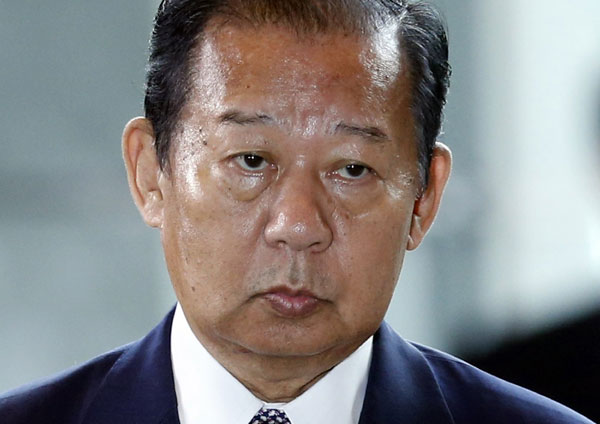Neighbors in new bid to heal ties
By ZHAO SHENGNAN (China Daily) Updated: 2015-02-27 03:59
New Executive Council Chairman of Japan's ruling Liberal Democratic Party Toshihiro Nikai arrives at Prime Minister Shinzo Abe's official residence in Tokyo Sept 3, 2014.[Photo/Agencies]

3,000-strong Japanese delegation, headed by top ruling party executive, to visit China in May
A top executive from Japan's ruling party is to head a 3,000-strong delegation to China in May, the latest indication of a thaw in the relationship between the two neighbors.
The delegation will comprise representatives from the business, local government and cultural sectors.
Toshihiro Nikai, chairman of the Liberal Democratic Party's General Council, said the May 22-24 trip is a chance to further improve ties.
"Everyone is hoping to see leaders from Japan and China shake hands. I believe this visit will help improve the current situation," Agence France-Presse quoted Nikai as saying at a news conference on Wednesday.
The trip is the latest attempt to warm ties after a two-year chill began to thaw in November. It will follow a surge in Chinese tourists to Japan before and during Spring Festival.
Expectations are high for the delegation's visit because of Nikai's political clout within his party and the former economy minister's close ties with China.
His appointment to the party post in September has been viewed widely as being a strong message from Japanese Prime Minister Shinzo Abe that Tokyo is serious about repairing ties with Beijing.
This month, Nikai headed a 1,400-strong delegation to South Korea and had a one-on-one meeting with South Korean President Park Geun-hye.
Wang Ping, a researcher of Japanese studies at the Chinese Academy of Social Sciences, said the large number of Japanese delegates and Nikai's role could warm still-cool ties, but a further breakthrough depends on Abe.
Sino-Japanese ties plunged to their lowest level in decades after Tokyo's illegal "nationalization" of China's Diaoyu Islands in 2012.
Abe plans to deliver a statement marking the 70th anniversary of the end of World War II this year.
But fears are rising in countries that fell victim to Japanese wartime atrocities, including China, that he will abandon the apologetic tone adopted by previous Japanese leaders.
President Xi Jinping and Abe met on the sidelines of the APEC summit in Beijing in November. However, frosty bilateral ties contributed partly to flat trade between the two countries last year.
- China means great opportunities instead of threat: Japanese business owner
- Overview of Sino-Japanese relations in 2014
- Forum on American friends and China's Anti-Japanese War is held in Shanghai
- Japanese scholar seeks the truth in Nanjing
- Japanese hear from massacre survivor
- Sino-Japanese ties have 'opportunity'
- Japan panel to discuss PM speech for anniversary of WWII end






